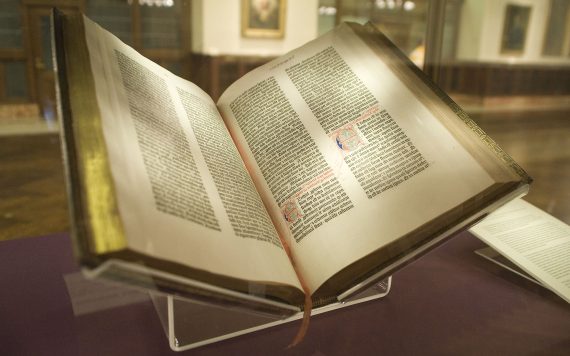Gutenberg Didn’t Invent The Printing Press
One of those things you learning in history class that isn’t necessarily true:
It is a little-known but undisputed historical fact that Johannes Gutenberg did not invent the printing press. Though the Gutenberg Bible was certainly the first mass produced printed work, it was hardly the first printed book — nor was it even the first made using movable type. Chinese and Korean inventors had been producing printed books for centuries before Gutenberg was born.
One of the truisms of Western history is that a German guy named Gutenberg invented the printing press, changing the course of civilization forever. There is no doubt that Gutenberg’s printing press was a novel technology. But to say that he invented the printing press is like saying Steve Jobs or Bill Gates invented the computer. He certainly made it a commercially available device, but Gutenberg’s role was as a popularizer and entrepreneur. As a technology, the printing press has its origins in Asia, where it existed for centuries before making its way to the West. Gutenberg’s real genius was in adapting the technology for a Western market, capitalizing on a few quirks of the Roman alphabet to bring printed books to the mainstream.
(…)
Over 350 years before Gutenberg was even born, the Chinese were experimenting with the technology that the German would later turn into a publishing empire.
Perhaps the best-known example of Chinese movable type printed books is Wang Zhen’s Book of Agriculture, printed in 1313. Wang improved on Bi’s device by using wooden moveable type (and possibly bronze) to set part of his book. Not only is the book remarkable for how it was printed, but also for being one of the most comprehensive records of Chinese science during the 14th century. Wang describes movable type in this book, noting that printers were also experimenting with tin for use in movable type devices.
Then, in 1377, we have evidence that a Korean monk named Baegun invented metal moveable type technology to produce the Jikiji (pictured), a book that collected pieces of Zen wisdom from great Buddhist teachers. With metal movable type, each character or letter would be cast as a separate metal piece, and then reused.
As the article goes on to note, it’s not so much that Gutenberg stole the Asian ideas since we don’t even know for sure how much he was aware of them. His true innovation, though was, adapting the technology for the Roman type and creating a printing press that could be used by anyone. Think of him as the Steve Jobs and Steve Wozniak of the 15th Century. Like them, he didn’t necessarily invent the technology, but he did create a new way of making it that made it more widely available.
H/T: Andrew Sullivan







Or sort of the Thomas Crapper of the flush toilet.
Yet another reason, on top of the Police Academy movies, to never forgive the guy.
If he wasn’t aware of it, he technically did invent it, he just wasn’t the first to do so.
This is not news to me, nor has it ever been. How does this break in knowledge of history develop? I learned back in grade school–and this is some 50+ years ago–that Gutenberg developed a Chinese invention. Were the nuns who taught me super-intelligent? How did they know this if the rest of the US was declaring him ‘inventor’?
I guess the nuns were well-educated themselves. They certainly taught the dark sides of Columbus’ journey and of Manifest Destiny. Was it because they, or their religious order, had to deal with the losers in those meetings?
@John Burgess: People who actually deal with the Bible have an appreciation for history.
To list all the things the Chinese did first would be an heroic task. For instance, and speaking of computers, they may have been the first to discover and use base 2 arithmetic. See the I Ching. If you know the book, then you’ll know about the pictograms (see the Trigrams section of the wiki article). The pictograms are pictorial representations in base 2. There are 64 of them, and they were originally arranged in order from 0 to 63. (The current ordering is due to a Chinese prince who got thrown in prison and passed the time rearranging them in a manner more pleasing to himself).
Leibniz recognized the base 2 when he first saw the I Ching. (And Leibniz, great borrower that he was, based the Monadology, I’m convinced, on the Hua Yen Sutra of classical Chinese philosophy, which he knew about from the writings of Jesuit priests in China. If you know Leibniz’s book, see Lord Indra’s Net, the central metaphor of the aforementioned sutra.)
@John Burgess: The dark side of the Columbus story seems easy to explain, because it was the priests that accompanied Columbus that are the source of that information.
As to Gutenberg, I guess that his innovation is typically tied to the Reformation, and the Whig view of history that ideas and technology advance ever upward in harmony.
I thought Obama said the Muslims invented it?
I have it on good authority that it was actually a Russian inwention.
I always figured that he invented it independently, albeit much later than when the Chinese invented it.
@PD Shaw
To be fair, the overall arc of human technological advancement once the Neolithic Revolution got under way does seem to have been upwards. You see continued, gradual technological progress even with various empires rising and falling.
Did you learning anything in English class?
Thank God that the Chinese or the Russians had created their own style of typesetting. If this indeed is true, Praise God for their role in Gutenburgs printing press. He did invent his printing press as it was designed and patented by him. Gutenburgs printing press was truly inspired by God, so that we all have the opportunity to read God’s Word. And by reading His Word, we learn how to have a relationship with our Supernatural God. After reading some of the replies on this subject, here is where God took me to in scripture: Matthew 7:2 Look it Up! God’s integrity demands justice, as Galations 6:7-9, Numbers 32:23, and Second Corinthians 9:6-8 affirm. Verses 3-5 (cf. also Rom. 2:1) indicate that people who are most critical of others have greater sins in their own hearts. Those really closest to God will be charitable, willing to forgive rather than to criticize, and anxious to lift up rather than to tear down.